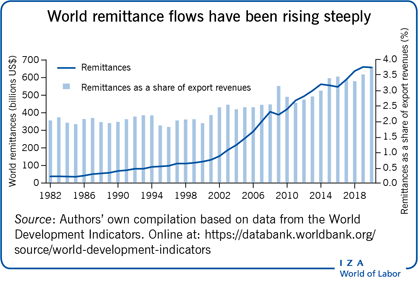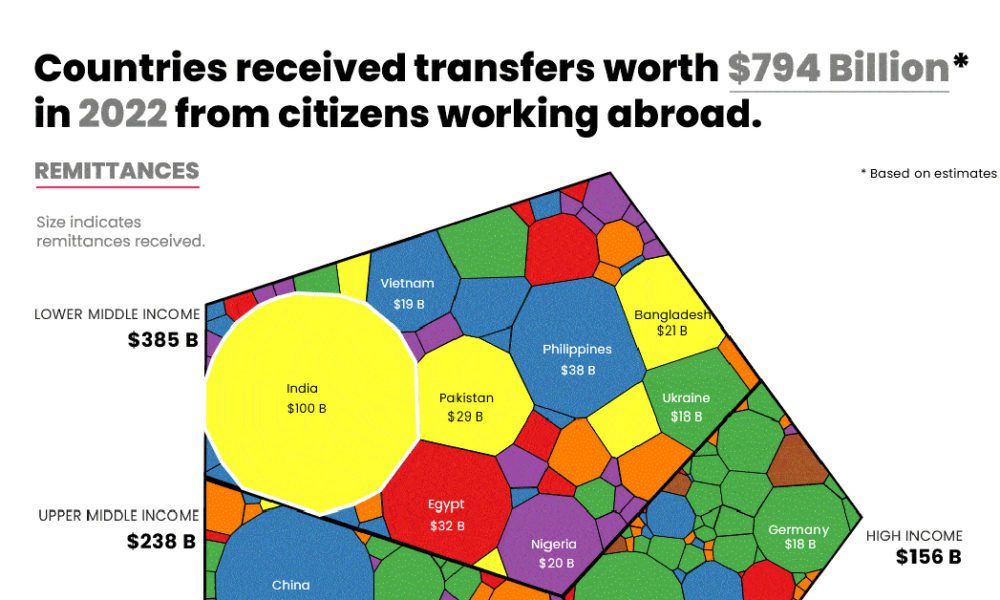How Do Remittances Impact the German Economy?
Remittances positively impact the German economy by increasing household income and boosting consumption. They also support economic stability and

Remittances positively impact the German economy by increasing household income and boosting consumption. They also support economic stability and growth.
Remittances are funds sent by migrants to their home countries. These financial transfers play a vital role in the German economy. Migrants working in Germany send a significant portion of their earnings back home. This inflow of money helps improve the living standards of their families.
In turn, it leads to increased spending on goods and services in Germany. This consumption boost stimulates the local economy, generating more business for retailers and service providers. Remittances also contribute to economic stability, as they provide a steady flow of income. This can cushion families against economic shocks and uncertainties.
Role Of Remittances In Economic Growth
Remittances play a significant role in the economic growth of Germany. These funds are sent by migrants to their families back home. They impact the economy in various ways. This section will explore how remittances boost consumption and enhance investments.
Boosting Consumption
Remittances increase the spending power of households. Families use these funds to buy goods and services. This leads to a rise in domestic demand. Higher demand boosts production, leading to economic growth.
Here are some key points:
- Increased household spending
- Higher demand for local goods
- Boost in production and sales
Remittances also help families improve their quality of life. They can afford better housing, healthcare, and education. This further drives economic activity.
Enhancing Investments
Remittances are not just spent on consumption. They also fund investments. Families use these funds to start small businesses. This creates jobs and stimulates economic growth.
Consider these benefits:
- Increased business creation
- Job creation and reduced unemployment
- Enhanced economic stability
Investments made with remittances can lead to long-term benefits. Small businesses grow and contribute more to the economy. This cycle promotes sustainable economic development.
| Impact | Details |
|---|---|
| Household Spending | Boosts demand for local goods |
| Business Creation | Encourages job creation |
| Economic Stability | Promotes sustainable growth |
Remittances are a key driver of Germany’s economy. They increase both consumption and investments, leading to growth.

Influence On Labor Market
Remittances play a crucial role in shaping the German labor market. They impact job creation and skill development. Understanding these effects is essential for economic growth.
Job Creation
Remittances help create jobs in various sectors. Migrants send money back home, boosting consumption. This increased spending leads to higher demand for goods and services. Businesses hire more workers to meet this demand.
Small and medium enterprises (SMEs) benefit the most. They see growth and expansion opportunities. New job openings appear, reducing unemployment rates. The construction, retail, and hospitality sectors see the largest gains.
Skill Development
Remittances also contribute to skill development. Migrant families invest in education and training. They use the funds to pay for schools and vocational courses. This leads to a more skilled workforce.
Technical skills and soft skills improve significantly. Workers become more efficient and productive. Businesses benefit from a better-trained labor pool. This enhances Germany’s overall economic competitiveness.
Effect On Financial Sector
Remittances play a crucial role in the German economy. They significantly impact the financial sector. This section explores how remittances contribute to banking growth and financial inclusion.
Banking Growth
Remittances boost the banking sector significantly. They increase the volume of transactions. This influx of funds encourages banks to expand their services.
Banks see remittances as a steady source of income. This leads to the creation of specialized remittance services. These services attract more customers, further growing the banking industry.
| Year | Remittance Inflow (in billion €) | Banking Sector Growth (%) |
|---|---|---|
| 2018 | 24.5 | 4.5 |
| 2019 | 26.0 | 4.8 |
| 2020 | 27.3 | 5.0 |
Financial Inclusion
Remittances promote financial inclusion. They bring more people into the formal banking system. This is especially true for migrant families who receive money from abroad.
These funds help families open bank accounts. They also encourage the use of other financial products like savings accounts and insurance. This increased participation strengthens the overall financial system.
- Increased bank account openings
- Higher usage of savings accounts
- More insurance policies
Financial inclusion leads to a more stable economy. It provides financial security for more people. This security translates into more investments and economic growth.

Social And Cultural Impact
Remittances play a significant role in shaping Germany’s social and cultural landscape. They foster cultural exchange and community support, enriching the lives of many. This section delves into these aspects.
Cultural Exchange
Remittances often lead to increased cultural exchange between Germany and the countries receiving the funds. Families use this money to visit Germany, bringing their traditions and customs. This exchange of cultures enriches German society.
For instance, traditional festivals, cuisine, and art from different cultures become more visible. German residents get to experience and enjoy these new cultural elements. This diversity makes Germany a more vibrant and inclusive place.
Community Support
Remittances provide crucial community support. They help families meet basic needs like food, education, and healthcare. This support strengthens ties within communities.
Local community centers often receive donations funded by remittances. These centers offer language classes, cultural events, and social services. This helps integrate new arrivals into German society more smoothly.
Below is a table showing how remittances impact community support:
| Aspect | Impact |
|---|---|
| Education | Funds for school supplies and tuition |
| Healthcare | Access to better medical services |
| Basic Needs | Improved living standards |
| Community Centers | More programs and activities |
Remittances empower families and communities. They create a supportive network that benefits everyone involved.
Challenges And Opportunities
Remittances play a crucial role in the German economy. They bring both challenges and opportunities. Understanding these factors helps shape better policies and economic strategies.
Regulatory Hurdles
Germany faces regulatory hurdles in managing remittances. Strict financial regulations ensure money laundering is minimized. But they also create challenges for senders and receivers.
Some of these hurdles include:
- Complex compliance requirements
- High transaction fees
- Slow processing times
These issues can discourage the use of formal channels. People might turn to informal methods, which are less secure.
Future Prospects
Despite challenges, the future of remittances in Germany holds promise. Technology can simplify the process and reduce costs.
Key opportunities include:
- Leveraging blockchain technology for faster transactions
- Adopting mobile payment solutions
- Enhancing financial literacy among migrants
These steps can make remittances more efficient and beneficial for the economy.
Here’s a table summarizing the challenges and opportunities:
| Challenges | Opportunities |
|---|---|
| Regulatory compliance | Blockchain technology |
| High transaction fees | Mobile payment solutions |
| Slow processing times | Financial literacy programs |
Addressing these factors can maximize the positive impact of remittances on the German economy.

Frequently Asked Questions
How Do Remittances Affect The Economy?
Remittances boost the economy by increasing household income, spurring consumption, and fostering small business growth. They improve living standards and reduce poverty.
How Does Immigration Affect The German Economy?
Immigration boosts the German economy by filling labor gaps, increasing productivity, and supporting the aging population. It stimulates innovation and entrepreneurship. Immigrants contribute to tax revenues and social security funds. This overall growth enhances Germany’s global competitiveness.
What Is Remittance In Germany?
Remittance in Germany refers to money sent by individuals working there to their families or friends abroad. This financial transfer supports recipients in other countries, often for daily expenses, education, or healthcare. Remittances play a crucial role in the economy of many developing nations.
What Are The Positive And Negative Effects Of Remittances?
Remittances boost household income, improve education, and enhance healthcare. They can also reduce poverty. Negative effects include dependency, reduced labor supply, and inflation in recipient countries.
Conclusion
Remittances play a crucial role in the German economy. They support household incomes and fuel economic growth. Additionally, remittances help in reducing poverty and promoting financial stability. Understanding their impact can guide better policies. This ensures a prosperous future for both senders and recipients.
Keep exploring this vital economic factor.















